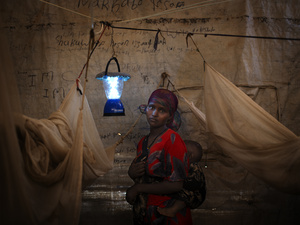UNHCR experts send to remote Ethiopian area to help 18,000 Somalis
UNHCR experts send to remote Ethiopian area to help 18,000 Somalis

UNHCR and other humanitarian aid organizations have been trying to help as many displaced Somalis as possible inside and outside the country.© UNHCR/S.Modola
NAIROBI, Kenya, August 23 (UNHCR) – The UN refugee agency has sent a team of experts in several disciplines to a remote area of eastern Ethiopia where some 18,000 Somali refugees are in urgent need of aid after fleeing their country.
The UNHCR team sent to Gode includes specialists in health, nutrition, protection, field coordination and registration. They have been deployed in coordination with the Ethiopian government, other agencies and non-governmental organizations (NGO) as part of a response to the influx at Gode.
"Their task is to profile and register the newly arrived refugees, identify needs and deliver aid. We will also help transport those refugees who are willing to be relocated to the existing camps in Dollo Ado," some 250 kilometres to the south of Gode, said UNHCR spokesman Adrian Edwards.
To meet the needs of the arrivals in Gode, who have fled drought, famine and conflict, UNHCR plans to airlift sufficient aid for 20,000 people to Ethiopia by the end of the week. The aid includes shelter items and household goods. Some 3,000 tents, supplied locally, are also being rushed to the area.
"A priority for us remains the need to save lives among this badly weakened population. Ensuring that new arrivals get food, water and medical attention is critically important," Edwards said. Several NGOs with field presences in the area are making limited interventions in the areas of health, nutrition and provision of water. UNHCR will provide additional support where necessary.
Edwards also said UNHCR was still concerned about the persistently high mortality rate at the Kobe camp in the Dollo Ado area. A major cause of death is suspected measles. The high prevalence of acute malnutrition, combined with poor hygiene practices, is compounding the problem.
A mass immunization campaign was conducted last week for children between the ages of six months and 15 years. It will take 10-14 days for the vaccine to be effective and thus for the mortality rates to drop. Together with the UN Children's Fund (UNICEF), UNHCR has just completed a second mass measles campaign in the Melkadida camp. Polio vaccination and screening for malnutrition were carried out at the same time for children.
In Somalia itself, distributions of emergency assistance packages have been continuing in the capital, Mogadishu, and southern parts of the country. Despite these deliveries, there are still many needs in the makeshift settlements in southern and central Somalia that accommodate many of the country's estimated 1.4 million internally displaced people. In addition to shelter, people also need food, access to clean water and medical facilities.
To meet the existing needs, a further 20,000 aid packages are to be sent by boat later this week from Dubai to Mogadishu. They will be distributed across southern Somalia. In June and July alone, UNHCR aid distributions inside Somalia have tripled, reaching more than 180,000 people.
In Kenya, meanwhile, UNHCR continues to relocate refugees from the outskirts of the three camps that comprise the Dadaab refugee complex (Ifo, Dagahaley and Hagadera). Refugees are being transported by bus to new sites. As of Monday, more than 18,000 refugees had been moved to the Ifo3 site. Relocation of refugees to the Ifo2 area, which began on August 18, is continuing. So far, 3,800 refugees have been moved to this site.
Last Friday, UNHCR also began moving refugees from the outskirts of the Hagadera camp to the Kambioos site. "As of yesterday we had moved more than 1,100 refugees to this site, which has capacity for up to 120,000 people," spokesman Edwards said. The three Dadaab camps host an estimated 440,000 refugees. On average, around 1,200 refugees arrive from Somalia every day.












